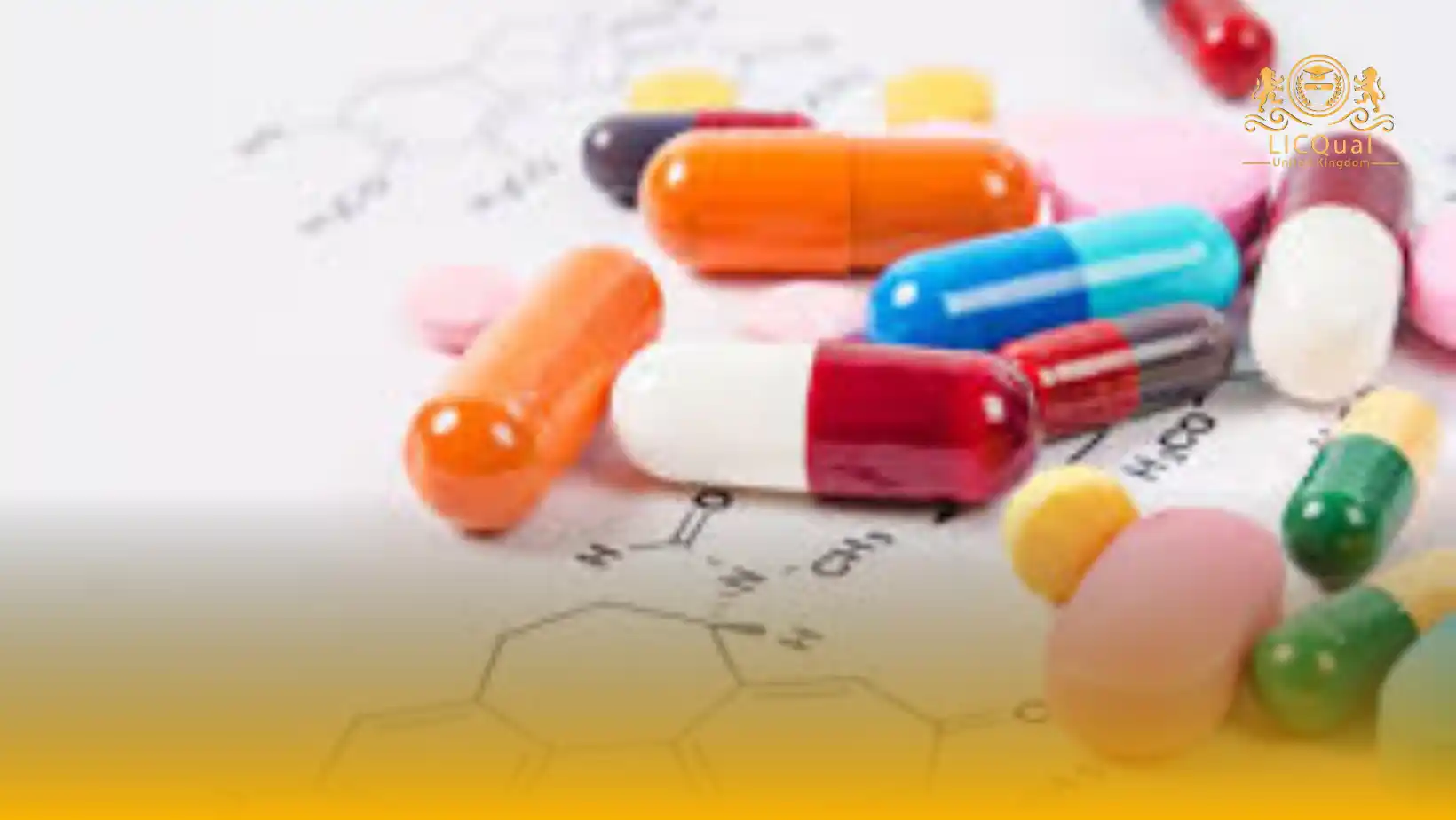The LICQual Level 3 Certificate in Medicinal Chemistry (Cert Medicinal Chemistry) is a specialised qualification designed for learners seeking to develop in-depth knowledge and practical skills in the field of medicinal chemistry. This course provides a comprehensive understanding of the chemical principles behind drug design, synthesis, and development, preparing learners to contribute effectively to pharmaceutical research, drug discovery, and related scientific industries.
This qualification is aimed at professionals who wish to enhance their career prospects, broaden their technical expertise, and strengthen their Continuing Professional Development (CPD). Learners will gain insight into the molecular basis of drug action, chemical modification of active compounds, and the development of new therapeutic agents. The programme combines theoretical knowledge with practical applications, ensuring that learners are well-equipped to meet the challenges of modern medicinal chemistry and pharmaceutical innovation.
Centres delivering this qualification must ensure that competent and qualified staff, along with all necessary learning materials, laboratory facilities, and resources, are available to provide a high-quality training experience. Access to up-to-date scientific literature, practical laboratory exercises, and structured guidance ensures learners can achieve their learning objectives effectively.
By completing the LICQual Level 3 Certificate in Medicinal Chemistry, learners will gain a recognised qualification that not only strengthens their professional competence but also opens pathways to further education and career progression in pharmaceutical research, drug development, and chemical sciences. This course represents an excellent opportunity for learners committed to advancing their knowledge and making meaningful contributions to healthcare and scientific innovation.
Course Overview
Qualification Title
LICQual Level 3 Certificate in Medicinal Chemistry (Cert Medicinal Chemistry)
Total Units
6
Total Credits
24
GLH
120
Qualification #
LICQ2201143
Qualification Specification
To enroll in the LICQual Level 3 Certificate in Medicinal Chemistry (Cert Medicinal Chemistry), applicants must meet the following criteria:
|
Qualification# |
Unit Title |
Credits |
GLH |
|---|---|---|---|
|
LICQ2201143-1 |
Fundamentals of Medicinal Chemistry |
4 |
20 |
|
LICQ2201143-2 |
Organic Chemistry and Drug Design Principles |
4 |
20 |
|
LICQ2201143-3 |
Pharmacology and Mechanisms of Drug Action |
4 |
20 |
|
LICQ2201143-4 |
Analytical Techniques and Laboratory Practices |
4 |
20 |
|
LICQ2201143-5 |
Regulatory Compliance, Ethics, and Quality Assurance in Medicinal Chemistry |
4 |
20 |
|
LICQ2201143-6 |
Research Methods and Emerging Trends in Medicinal Chemistry |
4 |
20 |
By the end of this course, learners will be able to:
Unit 1: Fundamentals of Medicinal Chemistry
Learners will be able to:
- Understand the principles and scope of medicinal chemistry within pharmaceutical sciences.
- Describe the chemical and biological basis of drug action.
- Explain the role of medicinal chemistry in drug discovery and development.
- Analyse the relationship between chemical structure and therapeutic activity.
Unit 2: Organic Chemistry and Drug Design Principles
Learners will be able to:
- Apply organic chemistry concepts to the design and synthesis of pharmaceutical compounds.
- Understand structure-activity relationships (SAR) in drug development.
- Evaluate strategies for chemical modification to optimise drug properties.
- Demonstrate knowledge of key reaction mechanisms used in medicinal chemistry.
Unit 3: Pharmacology and Mechanisms of Drug Action
Learners will be able to:
- Describe the pharmacokinetics and pharmacodynamics of therapeutic agents.
- Analyse mechanisms of drug action at molecular, cellular, and systemic levels.
- Understand therapeutic applications and potential side effects of drugs.
- Evaluate case studies to support evidence-based drug selection and optimisation.
Unit 4: Analytical Techniques and Laboratory Practices
Learners will be able to:
- Understand and apply analytical methods used in drug analysis and quality control.
- Perform laboratory techniques relevant to medicinal chemistry under safe conditions.
- Evaluate the accuracy, precision, and reliability of experimental data.
- Apply best practices for laboratory safety, documentation, and reproducibility.
Unit 5: Regulatory Compliance, Ethics, and Quality Assurance in Medicinal Chemistry
Learners will be able to:
- Understand regulatory frameworks governing medicinal chemistry and pharmaceutical products.
- Apply ethical principles in research, drug development, and clinical applications.
- Demonstrate knowledge of quality assurance processes in medicinal chemistry.
- Evaluate compliance requirements and their impact on product safety and efficacy.
Unit 6: Research Methods and Emerging Trends in Medicinal Chemistry
Learners will be able to:
- Apply scientific research methodologies to investigate medicinal chemistry topics.
- Critically evaluate current literature and emerging technologies in drug development.
- Understand the impact of innovation, including computational chemistry and biotechnology, on the field.
- Develop skills for independent research and reflective practice in professional development.
The LICQual Level 3 Certificate in Medicinal Chemistry (Cert Medicinal Chemistry) is designed for professionals, graduates, and researchers who want to advance their expertise in drug design, synthesis, and pharmaceutical sciences. This internationally accredited medicinal chemistry certification is ideal for those seeking CPD credits, career growth, and recognition in global healthcare and life sciences. Whether you are already working in the pharmaceutical industry or planning to specialize, this program equips you with the skills and qualifications to stand out in medicinal chemistry and drug development.
1. Practicing Pharmacists
- Professionals aiming to expand into drug discovery and pharmaceutical sciences
- Interested in molecular design and synthesis of therapeutic compounds
- Seeking accredited medicinal chemistry certification for career growth
- Looking to earn CPD credits recognized internationally
- Committed to improving patient outcomes through innovative medicines
2. Healthcare Professionals in Clinical and Research Settings
- Doctors, nurses, and allied health staff working with pharmaceutical products
- Those aiming to strengthen interdisciplinary collaboration in drug development
- Professionals seeking structured training in medicinal chemistry principles
- Interested in international healthcare qualifications for career progression
- Focused on enhancing patient safety and treatment compliance
3. Chemistry and Pharmacy Graduates
- Recent graduates seeking advanced medicinal chemistry certification
- Individuals preparing for international healthcare and pharmaceutical careers
- Looking to build expertise in drug design and synthesis
- Interested in flexible online learning with accreditation
- Focused on boosting employability in competitive healthcare markets
4. International Researchers and Scientists
- Professionals seeking globally recognized medicinal chemistry qualifications
- Those aiming to meet international accreditation standards
- Interested in CPD credits for career advancement abroad
- Looking to expand knowledge in pharmaceutical innovation practices
- Committed to strengthening professional credibility worldwide
5. Clinical Researchers and Academics
- Researchers focusing on drug discovery, molecular design, and trials
- Academics seeking structured certification for teaching and training
- Professionals aiming to contribute to evidence-based pharmaceutical studies
- Interested in advanced medicinal chemistry methodologies
- Looking to align with international healthcare education standards
6. Biotechnology and Pharmaceutical Industry Professionals
- Executives working in drug development, production, and regulation
- Professionals aiming to improve compliance with global standards
- Those seeking insights into medicinal chemistry manufacturing frameworks
- Interested in accreditation and quality assurance in pharmaceutical sciences
- Focused on strengthening organizational credibility and innovation
7. Professionals Seeking Career Advancement
- Individuals aiming for leadership roles in pharmaceutical and biotech sectors
- Those wanting to stand out with accredited medicinal chemistry certification
- Interested in international recognition and CPD credits
- Looking for career growth in hospital, clinical, or academic settings
- Committed to lifelong learning and healthcare excellence
Centres delivering the LICQual Level 3 Certificate in Medicinal Chemistry (Cert Medicinal Chemistry) must meet strict standards to ensure high-quality training, effective learner support, and compliance with international best practices. The essential requirements include:
- Qualified and Experienced Staff: Trainers and assessors must hold relevant qualifications and professional experience in medicinal chemistry, pharmaceutical sciences, or related chemical research fields.
- Comprehensive Learning Resources: Centres must provide access to up-to-date textbooks, scientific journals, laboratory manuals, case studies, and digital resources relevant to medicinal chemistry.
- Facilities and Equipment: Centres must ensure classrooms, laboratory facilities, and IT resources are adequately equipped for theoretical learning and practical exercises.
- Assessment and Quality Assurance: Centres must implement robust assessment procedures, internal verification, and quality assurance systems to maintain high academic and professional standards.
- Learner Support Services: Academic guidance, mentoring, and career development support should be available to ensure learners achieve successful outcomes.
- Access to Technology: Learners must have access to computers, reliable internet connectivity, and online platforms for blended or distance learning delivery.
- Compliance with Standards: Centres must adhere to LICQual policies, ensuring ethical training practices, learner safety, and regulatory compliance.
Meeting these requirements enables centres to deliver a world-class learning experience, ensuring learners gain the knowledge, skills, and confidence required to succeed in medicinal chemistry, pharmaceutical research, and drug development.
Assessment and Verification
All units within this qualification are subject to internal assessment by the approved centre and external verification by LICQual. The qualification follows a criterion-referenced assessment approach, ensuring that learners meet all specified learning outcomes.
To achieve a ‘Pass’ in any unit, learners must provide valid, sufficient, and authentic evidence demonstrating their attainment of all learning outcomes and compliance with the prescribed assessment criteria. The Assessor is responsible for evaluating the evidence and determining whether the learner has successfully met the required standards.
Assessors must maintain a clear and comprehensive audit trail, documenting the basis for their assessment decisions to ensure transparency, consistency, and compliance with quality assurance requirements.







